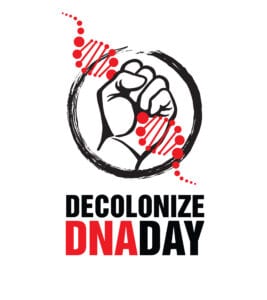Author: Latrice Landry, PhD

National DNA Day, designated as April 25th by the 108th U.S. Congress, celebrates the DNA double helix discovery of 1953 and the completion of the human genome project as two of the most significant scientific accomplishments in the past 100 years. ASHG has a long tradition of celebrating DNA day through a variety of individual and collective efforts. However, 2020 marks the first year of the De-Colonize DNA Day celebration, an effort to raise awareness and stimulate discussion about the societal and political implications of DNA. Here we share some information about the movement to de-colonize DNA and some highlights of the event and the day.
De-colonize DNA Day was held on April 24, 2020 as a twitter conference preceding the DNA day activities. The conference, organized by @kstsosie [Krystal Tsosise], @LMGLandry [Latrice Landry] and @doublehelixhist [Jerome de Groot], sought to re-frame narratives of #DNA. The reframing was achieved through critical discussions of the impacts of genomics and DNA on society as a whole, with a keen focus on communities who are underrepresented in genomics. The twitter social media platform allowed genetic professionals to engage a broader audience around the impact of DNA in society.
The schedule featured 8 speakers who each spent 30 minutes introducing their topic through text and photo-based tweets.
| 1 | @kstsosie [Krystal Tsosie]- Introduction: Decolonizing DNA while kicking As, Ts, Gs and Cs |
| 2 | @mitoPR [Maria Nieves-Colon]- Using Ancient DNA to revisit/disrupt/reconsider the historical record, especially for historically underrepresented populations in the Americas |
| 3 | @inthosegenespod [Janina Jeff]- Making genetics accessible to African descendants through the lens of Black culture |
| 4 | @Hood_Biologist [Shay-Akil McLean]- Looking at the biological consequences of racism without racializing human biology |
| 5 | @Hood_Biologist [Jeremy Yoder] – “Born this Way” is a double-edged blade in the era of personal genomics |
| 6 | @DarrylLeroux [Darryl Leroux] -“We’ve Been Here for 2,000 Years”: When DNA ancestry testing fuels anti-Indigeneity |
| 7 | @mathprofcarrie [Carrie Diaz Eaton]- B(UI)lding community and practices for a new data science education in biology |
| 8 | @KeoluFox [Keolu Fox] – Using emerging technologies to decolonize precision health. |
Following the presentations, panelists Elizabeth Nelson, Cesar Fortes-Lima, Jonathan Jackson, Nayda Ali, Diego Hernandez, Ray Allen, Tyler Tully, Jason Williams, Joseph Yracheta and Kevin Keys engaged the presenters in a question and answer session for 30 minutes, capturing takeaways with the hashtag, #DecolonizeDNA. The all-day event (lasting from 9 a.m. to 5 p.m. EST) not only garnered 461 tweets, 885 followers and 800 likes but fostered a dynamic discussion about DNA and its impact on identity and health across the public sphere. One audience member reflected, “I came away with an increased sense of responsibility to correct the issues…and to decolonize the field I hope to be a part of in the near future.” Another audience member noted “I’m blown away by how amazing the talks and topics were, the engagement by the panelists and twitter audience, and the steps being taken to #DecolonizeDNA and research.” In addition to the high caliber of the presentations, it is also important to emphasize that these presentations highlighted ideas, questions and research that are relatively absent in the larger mainstream genetics scientific discourse. As a genetics society, we have made it our mission to make the benefits of genetic research real for all. As we seek to achieve that goal, it is imperative that we continue to make strides in not only diversifying our genetic workforce, but also elevating the voices and research of those diverse audiences in our scientific ecosystem. For more information on this topic, search the #DecolonizeDNA hashtag on twitter, where you can see all the presentations and discussions.
NOTE: Many of the individuals mentioned in the schedule have graduate or professional degrees. For more information about the scholarly work highlighted in the presentations, please see the links provided within the De-Colonize DNA Day presentations using the hashtag #DecolonizeDNA.
